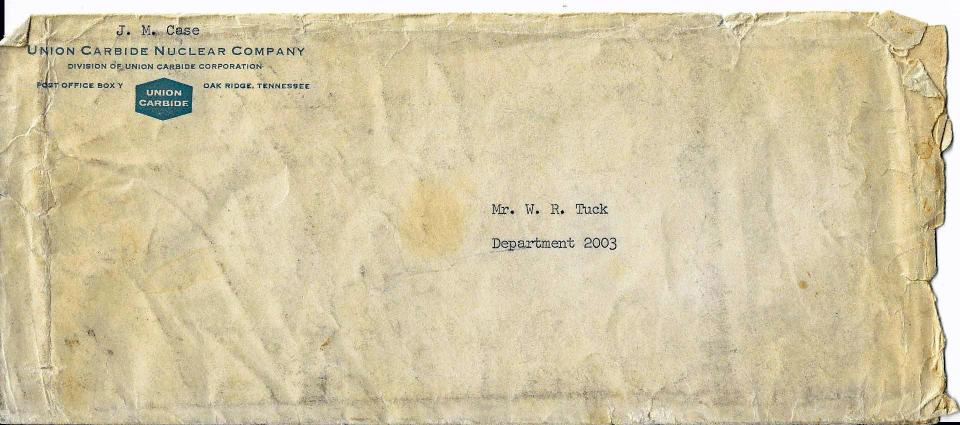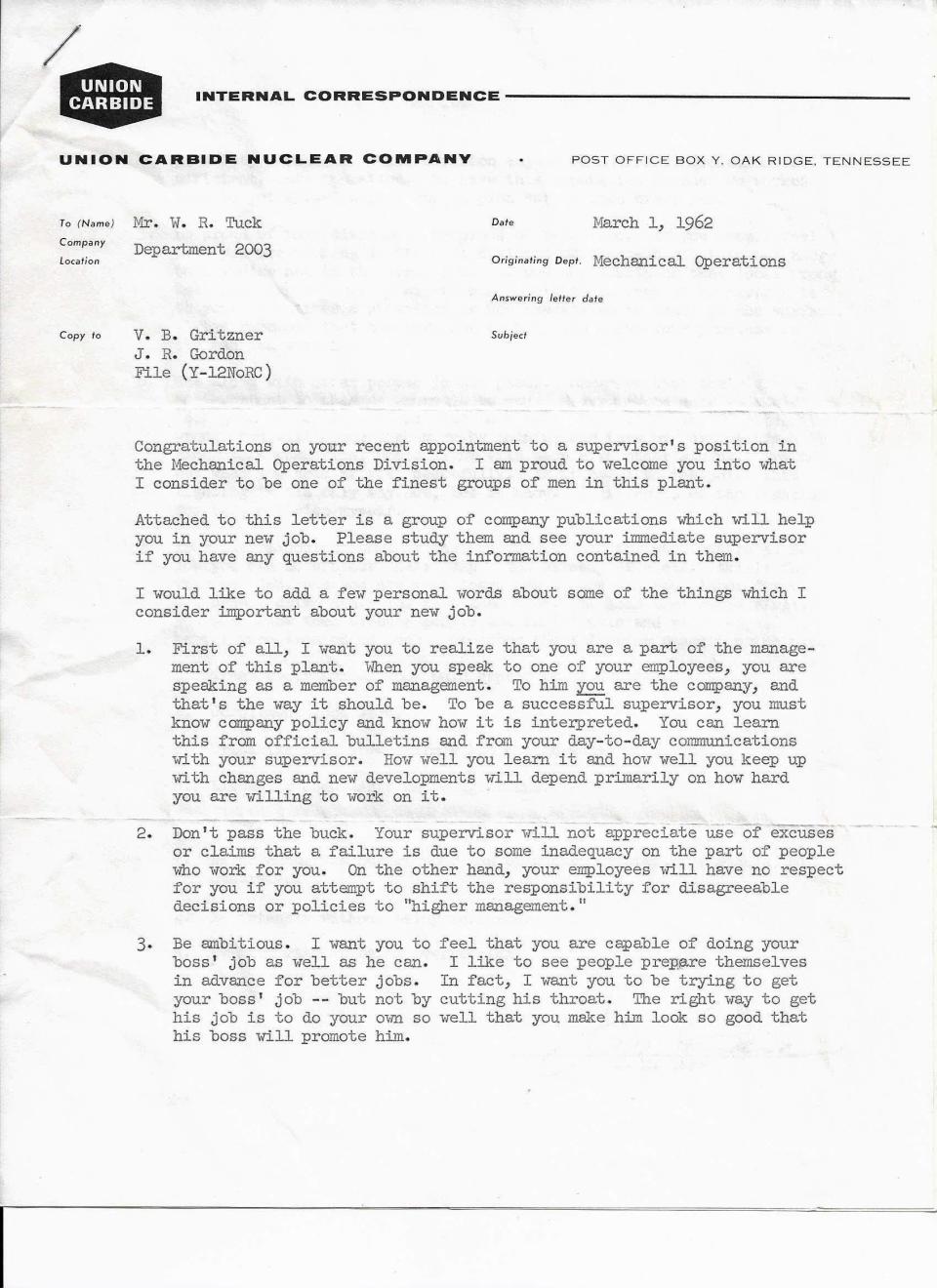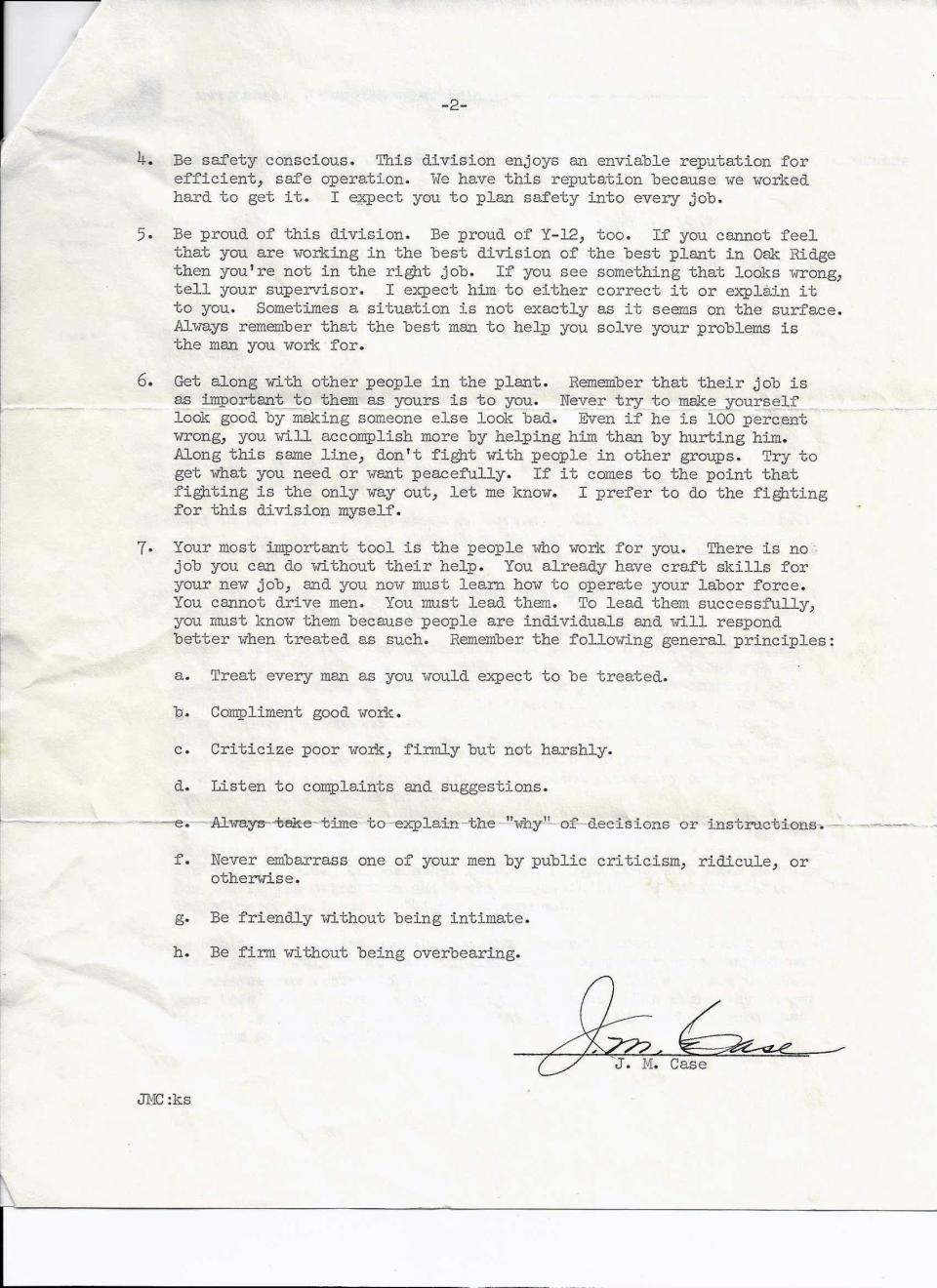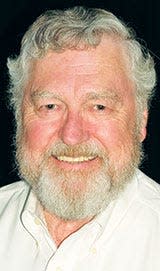Jack Case's letter to Bob Tuck - a lesson in effective leadership
Colleen Tuck just sent me a copy of a letter her dad, Wesley Robert "Bob" Tuck, received in 1962 from Jack Case, then the division head of mechanical operations at the Y-12 plant. Tuck was in Department 2003. I have the original letter that was given to me some years ago.

The letter contains some excellent leadership principles.
Here is the content of the letter in its entirety.
To: Mr. W.R. Tuck Date: March 1, 1962
Company Location: Department 2003 Originating Dept: Mechanical Operations
Copy to: V.B. Gritzner
J.R. Jordon
File (Y-12NoRC)
Congratulations on your recent appointment to a supervisor’s position in the Mechanical Operations Division. I am proud to welcome you into what I consider to be one of the finest groups of men in this plant.
Attached to this letter is a group of company publications which will help you in your new job. Please study them and see your immediate supervisor if you have any questions about the information contained in them.
I would like to add a few personal words about some of the things which I consider important about your new job.
1. First of all, I want you to realize that you are a part of the management of this plant. When you speak to one of your employees, you are speaking as a member of management. To him you are the company, and that’s the way it should be. To be a successful supervisor, you must know company policy and know how it is interpreted. You can learn this from official bulletins and from your day-to-day communications with your supervisor. How well you learn it and how well you keep up with changes and new developments will depend primarily on how hard you are willing to work on it.

2. Don’t pass the buck. Your supervisor will not appreciate use of excuses or claims that a failure is due to some inadequacy on the art of people who work for you. On the other hand, your employees will have no respect for you if you attempt to shift the responsibility for disagreeable decision or policies to “higher management.”
3. Be ambitious. I want you to feel that you are capable of doing your boss’ job as well as he can. I like to see people prepare themselves in advance for better jobs. In fact, I want you to be trying to get your boss’ job – but not by cutting his throat. The right way to get his job is to do your own so well that you make him look so good that his boss will promote him.
4. Be safety conscious. This division enjoys an enviable reputation for efficient, safe operations. We have this reputation because we worked hard to get it. I expect you to plan safety into every job.
5. Be proud of this division. Be proud of Y-12, too. If you cannot feel that you are working in the best division of the best plant in Oak Ridge, then you’re not in the right job. If you see something that looks wrong, tell your supervisor. I expect him to either correct it or explain it to you. Sometimes a situation is not exactly as it seems on the surface. Always remember that the best man to help you solve your problems is the man you work for.
6. Get along with other people in the plant. Remember that their job is as important to them as yours is to you. Never try to make yourself look good by making someone else look bad. Even if he is 100 percent wrong, you will accomplish more by helping him than by hurting him. Along this line, don’t fight with people in other groups. Try to get what you need or want peacefully. If it comes to the point that fighting is the only way out, let me know. I prefer to do the fighting for this division myself.
7. Your most important tool is the people who work for you. There is no job you can do without their help. You already have craft skills for your new job, and you now must learn how to operate your labor force. You cannot drive men. You must lead them. To lead them successfully, you must know them because people are individuals and will respond better when treated as such. Remember the following general principles:

a. Treat every man as you would expect to be treated.
b. Compliment good work.
c. Criticize poor work, firmly but not harshly.
d. Listen to complaints and suggestions.
e. Always take time to explain the “why” of decision or instructions.
f. Never embarrass one of your men by public criticism, ridicule, or otherwise.
g. Be friendly without being intimate.
h. Be firm without being overbearing.
J. M. Case
JMC:ks
When I first read this letter, I recalled Jack Case and appreciated him for his leadership and knowledge. I knew him as plant manager and respected him. If he knew who I was I never knew it. He was plant manager from 1967 to 1982.
Gordon Fee replaced Jack as Y-12 plant manager, and served from 1982 through 1990.
He also recalled these additional stories about Jack:
The story comes from one of the plant managers who attended the Albuquerque quarterly weapons managers meeting with Jack. In the first trip I took with him to that meeting, everyone told me how much they respect Jack and that he was known for bragging about what his people at Y-12 could do, meaning everything thrown at them by the design labs.
In the heat of a meeting about who was going to get the assignment to build bomb casings when it was announced that Y-12 was the location picked, one of the losing plant managers said to Jack, “I know that you think your people can build anything, even including an outhouse!”
At the next meeting, Jack presented a shiny brass outhouse with an engraved plaque on it, saying “fabricated at Y-12.” Not only was it made of brass, but it was made from an alloy that was almost impossible to weld, and this whole outhouse model was welded together with beautiful, shiny beads.
Mike Bradshaw and Bill Thompson worked for Jack and was part of the trip where they had to buy a 10-gallon hat for Jack’s girlfriend. The box was too big to fit in the luggage storage compartment on the airplane, so they took the hat out of the box, tossed the box, and took turns wearing the hat home.
I am convinced that the famous and continuing “Can Do” attitude and slogan still in use at Y-12 came from just such things Jack Case did. His leadership was phenomenal. He kept his union membership card with him and was well respected by all unions. He expected much from his managers and contributed much himself.
His son, Larry Case, worked for me managing the Office of Secure Transport garage. Larry took after his dad in that he led his department well.
Over the years, Jack Case worked as a toolmaker, a craft foreman, general foreman, general foreman for shops, maintenance department superintendent, maintenance division head, mechanical operations superintendent, assistant Y-12 plant superintendent, deputy superintendent for the Y-12 plant and finally Y-12 Plant superintendent in 1967. He served in that capacity until his retirement in January 1982.
At his retirement, Clyde Hopkins, then vice president of Union Carbide Nuclear Division, said, “He began work April 10, 1944, as a toolmaker, and in five years he was a superintendent. In 1954, he became manager of the largest production division in the plant – the old mechanical operations division, which involved 40% to 50% of the workers in the whole plant.
Clyde continued, “In the 1960s, he was made assistant plant manager and a few years later plant manager. Few persons are able to influence the lives of others as Jack Case has. He is one of the major reasons Y-12 has the reputation of a can-do outfit. And there is no question, but people will tell you he is a great fellow to work with.”
During his tenure as Y-12 Plant manager, Case was instrumental in preparing Y-12 to help win the Cold War. He championed the computerization of machine tools throughout Y-12. He sponsored the purchase of numerous machine tools that greatly expanded the capability of Y-12’s production. This enabled the grand scale of production of nuclear weapons secondaries during the 1980s that resulted in the complete failure of the Soviet Union and the end of the Cold War. The Soviet Union had attempted to keep up with the pace of manufacturing that Y-12 accomplished, but doing so actually led to the complete collapse of the communist economy.
As a result of Jack Case’s renown and his well-known contribution to Y-12 over the years, the name - Jack Case Center, was chosen in 2007 for the new 12,000 office facility that currently houses the main administrative, engineering and support organizations of all of Y-12.
This selection was a choice made by Y-12 employees that represented a 2-1 margin of voters is an indicator that several people still recall Jack Case, the manager at Y-12 with the longest tenure as leader and the person primarily responsibility for equipping Y-12 to help win the Cold War.
The “Oppenheimer” movie has brought attention to our nuclear age, and I find it interesting just how much we in Oak Ridge have seen increased visitation and people wanting to learn about our history. We call it the “Oppenheimer Effect.” At present that movie is the highest grossing World War II era movie ever. It has earned $947.5 million (as of 11/9/2023) and is still going.
D. Ray Smith is the city of Oak Ridge historian and his columns, "Historically Speaking," appear each week in The Oak Ridger.

This article originally appeared on Oakridger: Jack Case's letter to Bob Tuck - a lesson in effective leadership

